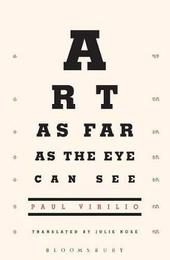
|
Art as Far as the Eye Can See
Paperback / softback
Main Details
| Title |
Art as Far as the Eye Can See
|
| Authors and Contributors |
By (author) Paul Virilio
|
|
Translated by Julie Rose
|
| Physical Properties |
| Format:Paperback / softback | | Pages:144 | | Dimensions(mm): Height 189,Width 134 |
|
| Category/Genre | Theory of art
Deconstructionism, structuralism and post-structuralism |
|---|
| ISBN/Barcode |
9781847885401
|
| Classifications | Dewey:701 |
|---|
| Audience | | Tertiary Education (US: College) | |
|---|
| Illustrations |
index
|
|
Publishing Details |
| Publisher |
Bloomsbury Publishing PLC
|
| Imprint |
Berg Publishers
|
| Publication Date |
1 January 2010 |
| Publication Country |
United Kingdom
|
Description
Paul Virilio puts art back where it matters - at the centre of politics. Art used to be an engagement between artist and materials. But in our new media world art has changed, its very materials have changed and have become technologized. This change reflects a broader social shift. Speed and politics - what Virilio defined as the key characteristics of the twentieth century - have been transformed in the twenty-first century to speed and mass culture. And the defining characteristic of mass culture today is panic. This induced panic relies on a new, all-seeing technology. And the first casualty of this is the human response. What we are losing is the very human 'art of seeing', one individual's engagement with another or with an event, be that political or artistic. What we are losing is our sense of the aesthetic. Where art used to talk of the aesthetics of disappearance, it must now confront the disappearance of the aesthetic.
Author Biography
Paul Virilio is one of our foremost cultural critics. Architect and urban planner and former director of the Ecole Speciale d'Architecture in Paris, he has written widely on film, architecture, art, war and technology. Julie Rose is a freelance translator and winner of the PEN Medallion for Translation.
Reviews"An exceptional, even visionary mind." Leonardo Digital Reviews "If Walter Benjamin had one true intellectual descendant who extended his inquiries into the second half of the twentieth century, this must be Paul Virilio." Lev Manovich, author of The Language of New Media "'Virilio is an impressive commentator on the conditioning power of the mass media. ... He flits from image to image like a poet and usually builds to a profound climax." The Guardian
|